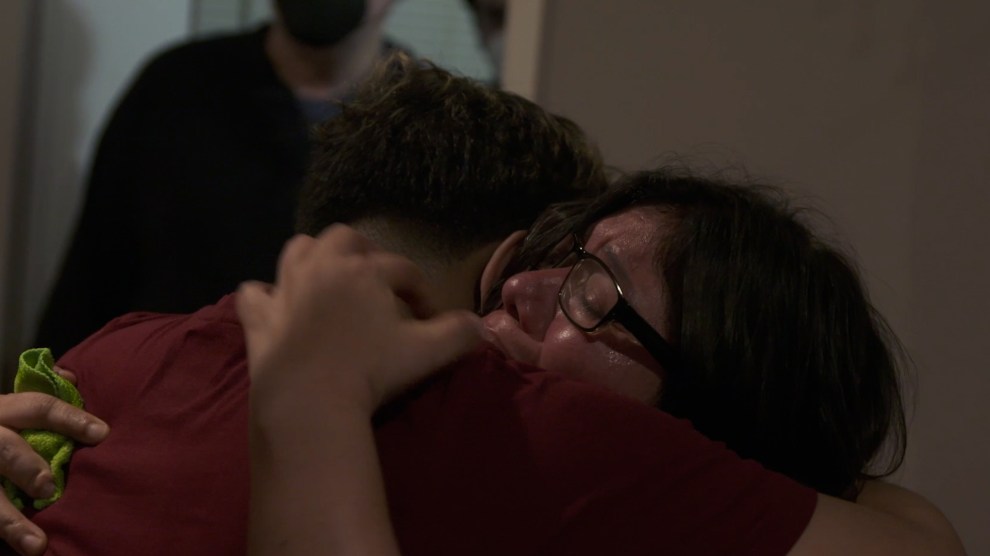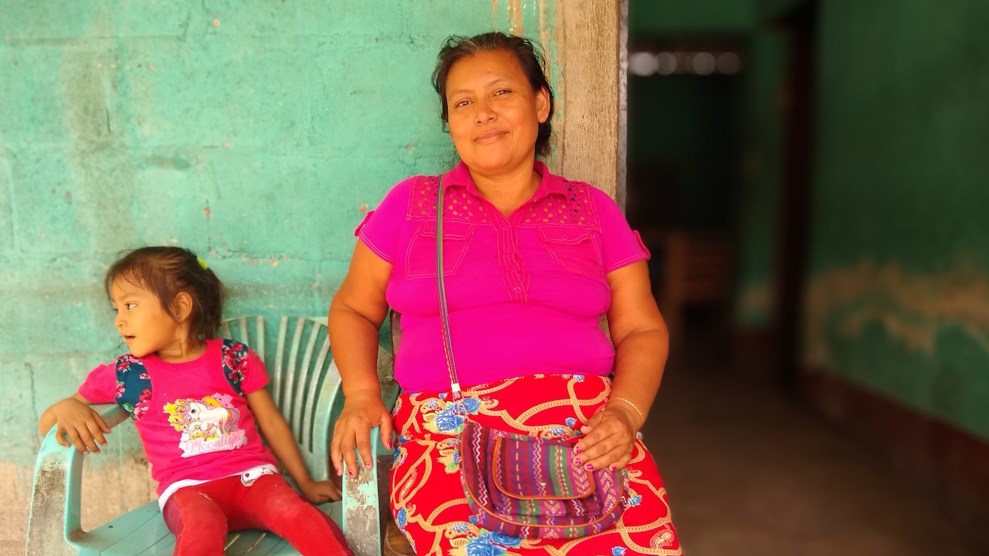
Australian Broadcasting Corporation
The last time Keldy Mabel Gonzáles Brebe de Zúniga hugged her sons Erik and Mino, they were 13 and 15 years old and seemed “so little” to her. Tuesday night, she reunited with them in Philadelphia, almost four years after being separated at the border by the Trump administration. Now, her sons towered over her.
“I was overwhelmed with happiness and could feel all the love my sons have for me,” she told me Thursday. “I longed for that hug and for that moment to be with my children again.”
The family’s story was first reported by the New Yorker‘s Jonathan Blitzer on Wednesday; he had spent three years speaking with Gonzáles Brebe de Zúniga and joined a film crew from the Australian Broadcasting Corporation for the reunion Tuesday night. When I spoke with Gonzáles Brebe de Zúniga, she’d been reunited with her family for just a day and a half and was still understandably emotional.
Gonzáles Brebe de Zúniga was separated from Erik and Mino in El Paso back in September 2017, as the Trump administration implemented what was then a pilot program but which would become an official family separation policy at the US-Mexico border.
“The separation caused much pain and so much suffering,” Gonzáles Brebe de Zúniga said. “That moment of being separated broke our hearts and it marked our lives forever.”
The family fled Honduras “after losing close family members to violence and facing direct threats to their lives,” according to Las Americas Immigrant Advocacy Center, the El Paso-based nonprofit representing her. After reaching the border, Gonzáles Brebe de Zúniga sought asylum in the United States but instead was taken away from her children. The teenage boys were held first by US Customs and Border Protection, then sent to a shelter, and ultimately were released to their aunt who was already living in the United States. Meanwhile, their mom was jailed in an immigration detention facility in El Paso for two years. She was then deported back to Honduras in 2019, to the place she fled to protect her life and the lives of her sons.
It didn’t take long for Gonzáles Brebe de Zúniga to make the trek back to the US border again, never losing hope that one day she’d find a way to be with her two sons again. She was then stuck in Cuidad Juárez while Las Americas staff “tried every possible legal avenue” to get her reunited with her children.
Then, just a week after taking office, Biden signed an executive order forming a task force to reunify migrant families separated by the Trump administration under its “zero tolerance” policy between January 2017 and January 2021. In that time, the Trump administration separated more than 5,500 families at the border and more than 1,000 of them remain separated today. On Sunday, Department of Homeland Security Secretary Alejandro Mayorkas announced that the administration would start to reunite some of those families in the United States this week. Also on Sunday, Michelle Brané, a longtime advocate for migrant women and children who now serves as the executive director of the administration’s reunification task force, said that separated parents will enter the United States via humanitarian parole, though the task force is looking at ways to provide parents with longer-term statuses in the country. Gonzáles Brebe de Zúniga was one of those first four parents brought through the special permit, which will give them work authorization and protection from deportation for the next three years.
“Tuesday night, for the first time in three and a half years, two children were able to get a kiss goodnight from their mother after the U.S. government ripped them apart from the most important person in their lives,” said the mother’s attorney Linda Corchado, director of Legal Services at Las Americas, in a press release. “Children flee persecution every day around the world, and our country is capable of honoring our asylum laws and respecting the dignity of families. On Tuesday, we saw the power of a mother’s love. Let this be the example for the change we fight for every single day.”
But still, so many more families are not as lucky, at least not yet. As my colleague Noah Lanard wrote Monday, organizations like Al Otro Lado, an immigrant advocacy group based in California and Baja California, have criticized Biden’s slow progress, arguing the administration did little to bring the parents and children back together in the last few months. The American Civil Liberties Union was one of the first to sue to stop the family separation policy in 2018 and it continues to negotiate with the Biden administration. Lee Gelernt, the lead attorney in the lawsuit, has said that all families who remain separated must be reunified, and the US government must provide trauma-related medical care, offer a path to permanent legal status, and ensure that family separations “never occur in the future.”
But, at least for now, there is some relief for Gonzáles Brebe de Zúniga and her family. As she told me, “Throughout those years I often went to sleep imagining that I would hug my kids again, and that moment has come true.” She added that as she and her sons held each other and sobbed Tuesday, she kept thinking to herself, “Is it true? Is this really happening?”
“I still kept thinking back to how it was even possible that they were taken from me, and that this ever happened to us.”








